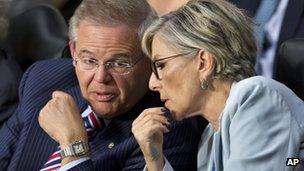Senate's Syria motion does not preclude 'mission creep'
- Published

Senators Robert Menendez and Barbara Boxer confer during a hearing on intervention in Syria
The Senate Foreign Relations Committee will probably win the race to come up with the first resolution on Syria from Congress. Its two leading Democratic and Republican members have agreed a wording, external which binds the president's hands.
It limits military action to 60 days and rules out combat troops on the ground. President Barack Obama may not be too unhappy with it. It uses his own words, such as "tailored" and "limited" action.
No-one to whom I've spoken thought action would last two months, and President Obama and his generals don't want boots on the ground.
But in his testimony, Secretary of State John Kerry demonstrated to some, external who are cautious about action why this sort of language is necessary. He mused that if Syria imploded, special forces might have to go in and secure chemical weapons.
The language of the draft doesn't forbid that, but it does show mission creep is possible. I've never understood myself why securing the chemical weapons is not America's main priority.
But that's beside the point. If the president is not unhappy with this first motion, some who want deeper and more serious involvement, aimed at toppling Syrian President Bashar al-Assad, may be.
There's still a lot of reluctance on Capitol Hill. Many doubts are backed up by the mood in America. A new poll, external indicates a big majority against action.
However cautious the senators' motion, they would still be authorising something the American public don't want to happen.